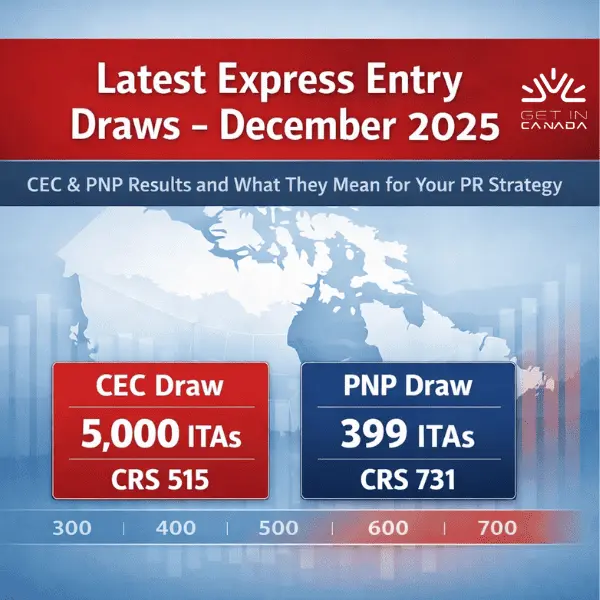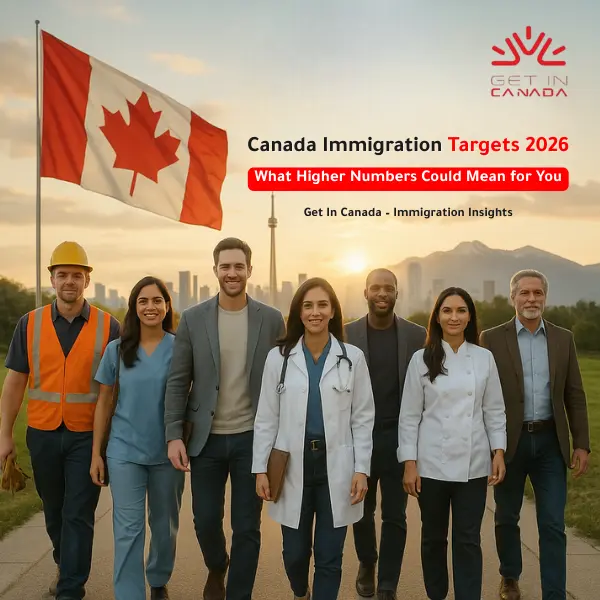Work Permit Options for International Graduates Without PGWP Eligibility
International students who are no longer eligible for a Post-Graduation Work Permit or those with a PGWP that is about to expire may still find ways to work in Canada legally. There are several work permit options, each with its requirements and benefits. This blog will discuss these alternatives to help you build your career in Canada.

Key Work Permit Options for International Graduates
Let’s discuss the key work permit options for international students:
- Free-Trade Agreement-Based Work Permits
- International Experience Canada (IEC)
- Temporary Foreign Worker Program (TFWP)
- Atlantic Immigration Program (AIP)
- Provincial Nominee Program (PNP)
- Spousal Open Work Permits
Each work permit option is designed for different kinds of immigrants depending on their circumstances, starting from nationality, job title, and marital status.
Find out if you are eligible to get in Canada →
What are the key work permit options for international students?
Here is a detailed overview of the options:
1. Free-Trade Agreement-Based Work Permits
Canada has established free trade agreements with several countries; these work permit options were given to citizens of those countries under the International Mobility Program (IMP). For example:
- Canada-United States-Mexico Agreement (CUSMA): This agreement facilitates work permits for eligible professionals, traders, and investors from these three countries.
If you are a citizen of a country with such an agreement, then you are eligible; check the specific terms of the agreement related to your country to determine if you qualify for a work permit.
2. International Experience Canada (IEC)
This program offers three streams of work permits for citizens of countries with bilateral youth mobility agreements with Canada. Your age range must be between 18 to 35 years at maximum and 18 to 30 for some countries.
Streams Under IEC:
- Working Holiday: It is an open work permit that allows you to work for any employer in Canada.
- Young Professionals: An employer-specific permit requires a job offer that contributes to professional development.
- International Co-op (Internship): It is also an employer-specific permit that requires a work placement tied to your academic program.
France, Germany, Australia, Japan, and the United Kingdom are the 5 countries that participate in the IEC program. The work Holiday stream is known to operate through a lottery system, while Young Professionals and International Co-op are easy for approval in case of meeting the eligibility requirements.
This program is a good option for those who aren’t eligible for the other 2 work permit options, but it is an employer-specific permit that obligates you to work for the employer named in the permit but not any employer.
To qualify, your employer must:
- Obtain a Labour Market Impact Assessment (LMIA) to show hiring a foreign worker won’t negatively affect the Canadian labour market.
- Meet additional requirements, depending on the stream.
Some roles fall under the Global Talent Stream, which fastens the process of getting LMIA and work permit applications for highly skilled professionals.
Note: As of September 26, 2024, the low-wage stream of the TFWP in areas with high unemployment rates (over 6%) is temporarily suspended, which results in limited opportunities in some regions.
4. Atlantic Immigration Program (AIP)
This program is designed for immigrants who wish to work and settle in one of Canada’s Atlantic provinces, which are:
Eligibility Criteria:
- You must have a job offer from a designated employer in the Atlantic region.
- The job offer must be endorsed by the province.
- Additional requirements include language proficiency, education, work experience, and settlement funds.
Once applying for permanent residence through the AIP in Canada, you can apply for an employer-specific work permit valid for up to two years.
5. Provincial Nominee Program (PNP)
The provincial nomination allows provinces and territories to nominate applicants for permanent residency. Also, it issues work permits to applicants who are waiting to get their permanent residency.
For instance:
- British Columbia PNP (BC PNP): Issues work permit support letters to nominees.
As of December 31, 2024, Canada has announced a temporary public policy that allows the issuance of work permits to PNP applicants. Currently, Alberta, Manitoba, and Yukon are participating in this program.
Eligibility requirements vary by province, so visit the following page for more details.
6. Spousal Open Work Permits
Spousal work permits offer a pathway to work in Canada under two scenarios:
- Post-Secondary Studies: If your spouse is on a study permit and enrolled in a qualifying post-secondary program, you may qualify for an open work permit. Eligible programs include:
- Master’s or PhD programs (at least 16 months long).
- Professional degree programs (e.g., law, medicine, pharmacy).
- Family Sponsorship: If your spouse is a Canadian citizen or permanent resident sponsoring your permanent residence application, you can apply for an open work permit. This requires you to reside in Canada with valid temporary resident status.
FAQs and Additional Considerations
Can you work while awaiting a work permit decision?
Yes, under these conditions:
- You are authorized to work off-campus during your studies.
- You have applied for a work permit before your study permit expired.
- You maintain valid temporary resident status in Canada.
What are the changes to PGWP eligibility?
As of November 1, 2024, new rules were announced on certain college and vocational programs. Graduates from this program are eligible to apply only if their field of study aligns with Canada’s labour market needs. However, university graduates (bachelor’s, master’s, and PhD) are unaffected by these restrictions.
If you are an international graduate facing a problem with the expiry of your PGWP or are not eligible to apply for it, you still have more than one option to use. Whether through free trade agreements, provincial programs, spousal permits, or employer-sponsored pathways, these alternatives can help you continue your career in Canada.
Contact us for consulting with our experienced immigration consultant to find the best option for your situation and ensure a smooth application process.











